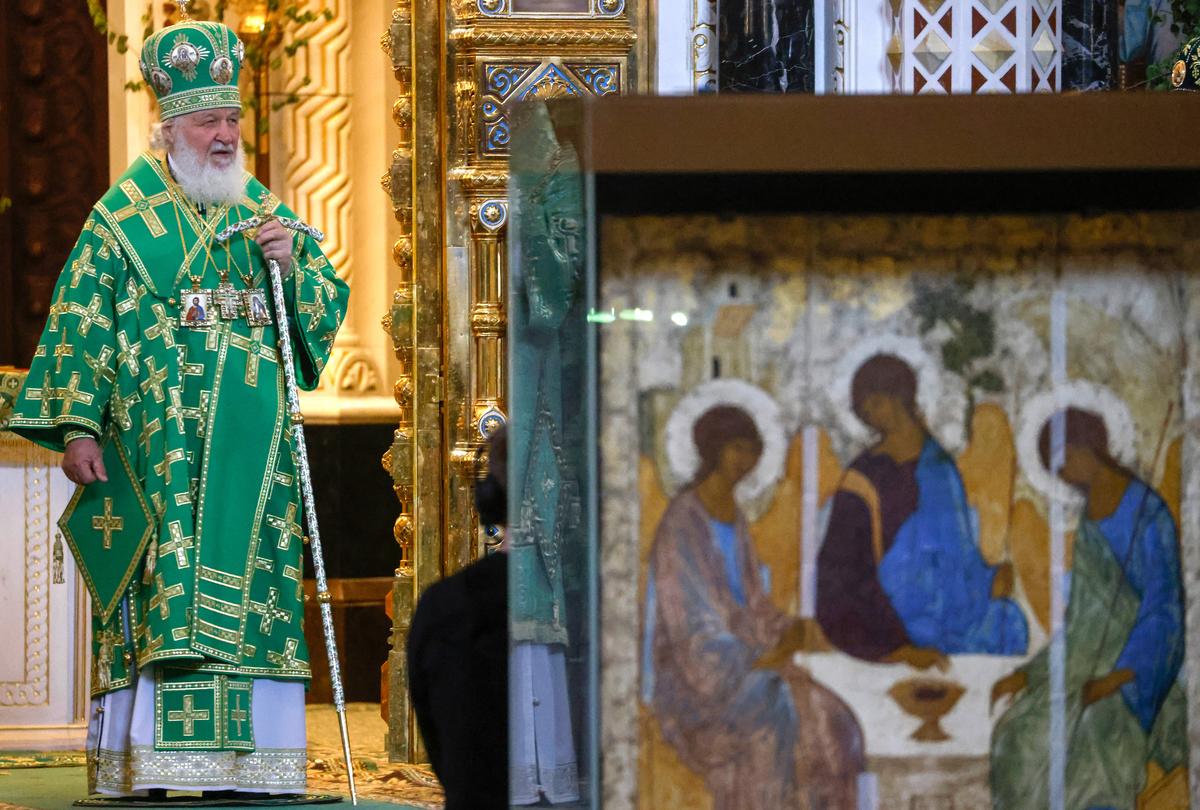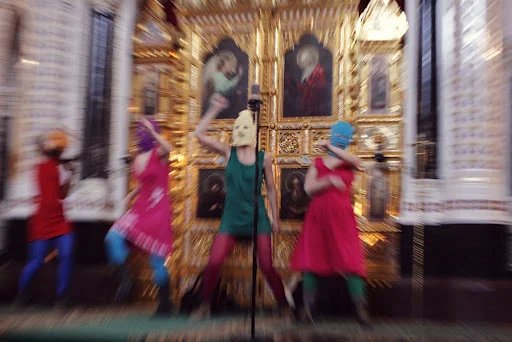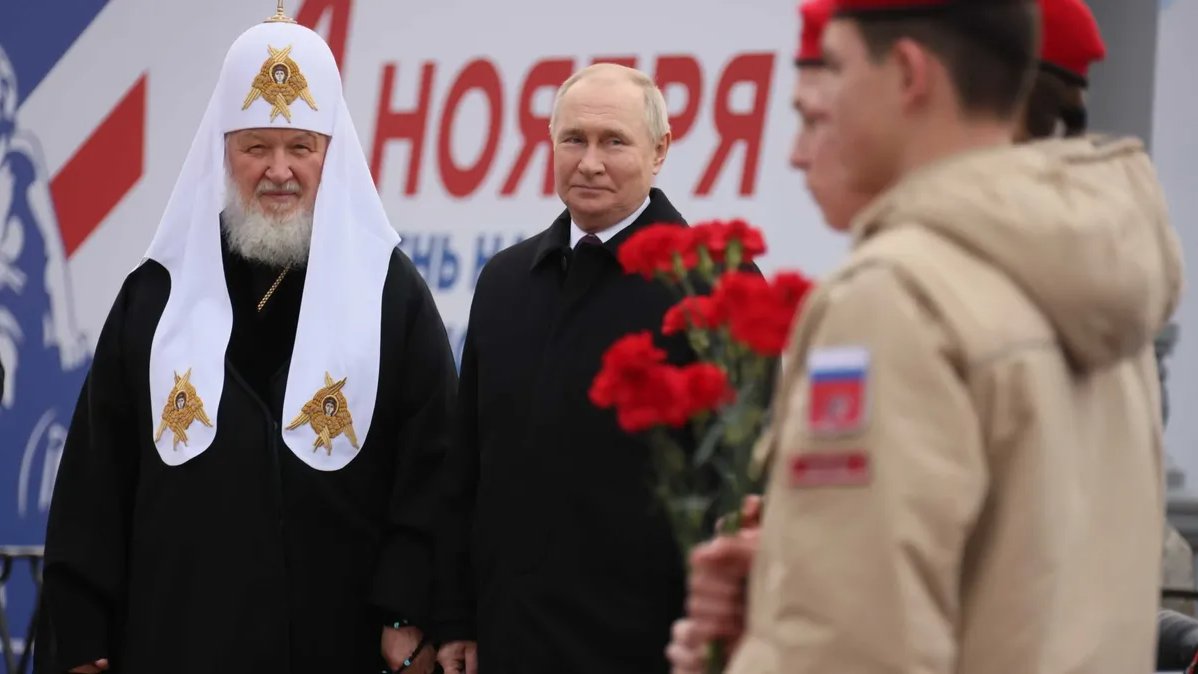Last Saturday’s National Unity Day in Russia was a memorable one for Patriarch Kirill, the Kremlin-appointed head of the Russian Orthodox Church, as it saw him receive this year’s presidential prize from Vladimir Putin.
Kirill received his latest award from the state in the grandeur of the Kremlin, after which he accompanied Putin to Red Square where they lay flowers at a monument commemorating the Russian victory over an invading Polish army in 1612. Meanwhile, in Kyiv, the Ukrainian authorities announced that a criminal case had been opened against the patriarch for his denial of Ukraine’s territorial integrity, justifying armed aggression, and incitement of violence. What exactly has Kirill done to merit such a display of simultaneous recognition and condemnation?
Special Military Sanctification
Officially, the presidential prize commended Kirill for helping “strengthen the unity of the Russian nation”. His putative function as a unifier is something Kirill has exhibited by leading the World Russian People’s Council (WRPC), an organisation ostensibly representing anyone who considers themselves Russian, and which came to the Kremlin’s rescue last year by helping bolster support for the war. One of its initiatives, for example, was suggesting in all seriousness that SVO, the abbreviated form of special military operation, the euphemistic term for the war in Ukraine in Russian, be made to stand for sacred military operation instead.

Patriarch Kirill in Moscow’s Cathedral of Christ the Saviour in June. Photo: EPA-EFE / SERGEI ILNITSKY
The WRPC also provided a helpful summary of what Russian identity currently involves: writing that it was based on Russian men’s desire to sacrifice themselves “for faith, for the tsar, and for the fatherland.” The role of Russian women in this equation is, should you need to ask, giving birth to more self-sacrificing men.
Kirill is the main proponent of a special “theology of war”, which boils down to two main arguments. First, a stronger nation has the right to subjugate a weaker one that does not submit to it voluntarily. Second, entry to heaven is guaranteed for anyone who gives their life to bring about this subjugation.
Russian World
Kirill’s radical stance on the war in Ukraine understandably shocked many Christians worldwide. But it was far less surprising to anyone who’d followed the patriarch’s ideological evolution. Even before his appointment to Russia’s most important clerical role, Kirill had spent the last three decades gradually advancing a new xenophobic and isolationist religious doctrine that aligned perfectly with the prevailing worldviews of the emergent Putin regime.
A key element in Kirill’s doctrine is his belief in the so-called Russian World, which advocates the creation of a single “all-Russian nation” to include Russia, Ukraine, and Belarus, and placed under the control of the Russian Orthodox Church.
Other Orthodox Christians and even unorthodox but ultra-conservative ones (as long as they are oriented towards Russian culture and are keen on renouncing Western cultural superiority) are also invited to join the movement.
The more ruthless the Putin regime became, the more explicit Kirill’s theological remarks sounded. On the eve of the Russian invasion of Ukraine last year, when most people — including a majority of Russians — still believed that war could be avoided, Kirill seemed to think otherwise, warning that there was “no war without sacrifice,” after laying a wreath at the Tomb of the Unknown Soldier in Moscow.
Last December, after thousands of civilian casualties and months of Russian missile strikes on Ukrainian cities, the spiritual leader of Eastern Orthodox Christians, Patriarch Bartholomew of Constantinople, officially declared the Russian World a heretical doctrine. Patriarch Kirill’s distorted theology had become, Bartholomew said, “the ideological basis of the Putin regime”.
Forging new alliances
Having denounced — and been denounced by — many Christians abroad, the Russian Orthodox Church has found new allies among the world’s Muslims, and Iranian Muslims in particular. In this regard, too, Kirill followed Putin’s lead, recalling that when asked by journalists about the attitude of Orthodoxy to Christianity and Islam, the Russian president had answered: “We are closer to Islam.” Kirill said that he agreed with Putin: “Both Islam and Orthodoxy belong to the same Eastern group.”
These comments are reminiscent of the politically convenient theology espoused by one of Kirill’s Soviet predecessors, Metropolitan Nikodim of Leningrad, who insisted rather unconvincingly that Russian Orthodoxy and atheism — the state-sponsored religious preference at the time — were similar. “Communist atheism is a system of beliefs, including moral principles, which do not contradict Christian morals,” he said.
Kirill is not just an apologist for Putin’s war; he has also long been a source of Putin’s presidential legitimacy.
In 2012, when Putin decided to run for a legally dubious third term, Kirill personally invited Putin to visit the Danilov Monastery — a move that many viewed as him “giving his blessing”.
One reaction to this “blessing” was Pussy Riot’s “punk prayer” in the Cathedral of Christ the Saviour, whose lyrics — “Mother of God, drive Putin away” — landed its performers in prison.

Pussy Riot perform their “punk prayer” in Moscow’s Cathedral of Christ the Saviour in 2012. Photo: a-pesni.org
The band’s assertion that the patriarch believed not in God but in Putin clearly hit a nerve, as Kirill’s subsequent push for Pussy Riot’s imprisonment was made with notable bitterness.
From victim to perpetrator
Kirill, who spied for the KGB in Geneva under the name “agent Mikhailov” in the 1970s, continues to serve the Putin regime in various important ways, ranging from pumping billions through numerous trusts worldwide that were set up to restore Russian monasteries, to providing an extensive international network of Russian churches, many of which provide cover for Russian intelligence agents.
The Kremlin is also no doubt grateful to Kirill for his swift suppression of opposition within the Church; he has expelled all members of the clergy who have dared to express even a hint of dissent or to show the mildest sign of free thought. In today’s Russian Orthodox Church, for instance, priests can face punishment if they lead prayers for peace rather than for victory.
One might say that Patriarch Kirill has sacrificed a lot for his continued allegiance to Putin. Thousands of former Russian Orthodoxc Church parishes abroad, primarily in Ukraine, have cut their ties with the Moscow patriarchate. He has forsaken relations with western religious leaders, which had been improving in the run up to Russia’s invasion of Ukraine. He has lost his international standing, his legal status abroad, and his foreign assets, having been directly targeted by sanctions from multiple countries, currently not even being permitted to visit his favourite chalet in Switzerland.
The Russian Orthodox Church survived years of Soviet repression only to become an organ of repression itself under Kirill. Of course, that is, in the eyes of the Kremlin, the most significant “achievement” of this year’s presidential prize laureate.
Join us in rebuilding Novaya Gazeta Europe
The Russian government has banned independent media. We were forced to leave our country in order to keep doing our job, telling our readers about what is going on Russia, Ukraine and Europe.
We will continue fighting against warfare and dictatorship. We believe that freedom of speech is the most efficient antidote against tyranny. Support us financially to help us fight for peace and freedom.
By clicking the Support button, you agree to the processing of your personal data.
To cancel a regular donation, please write to [email protected]

